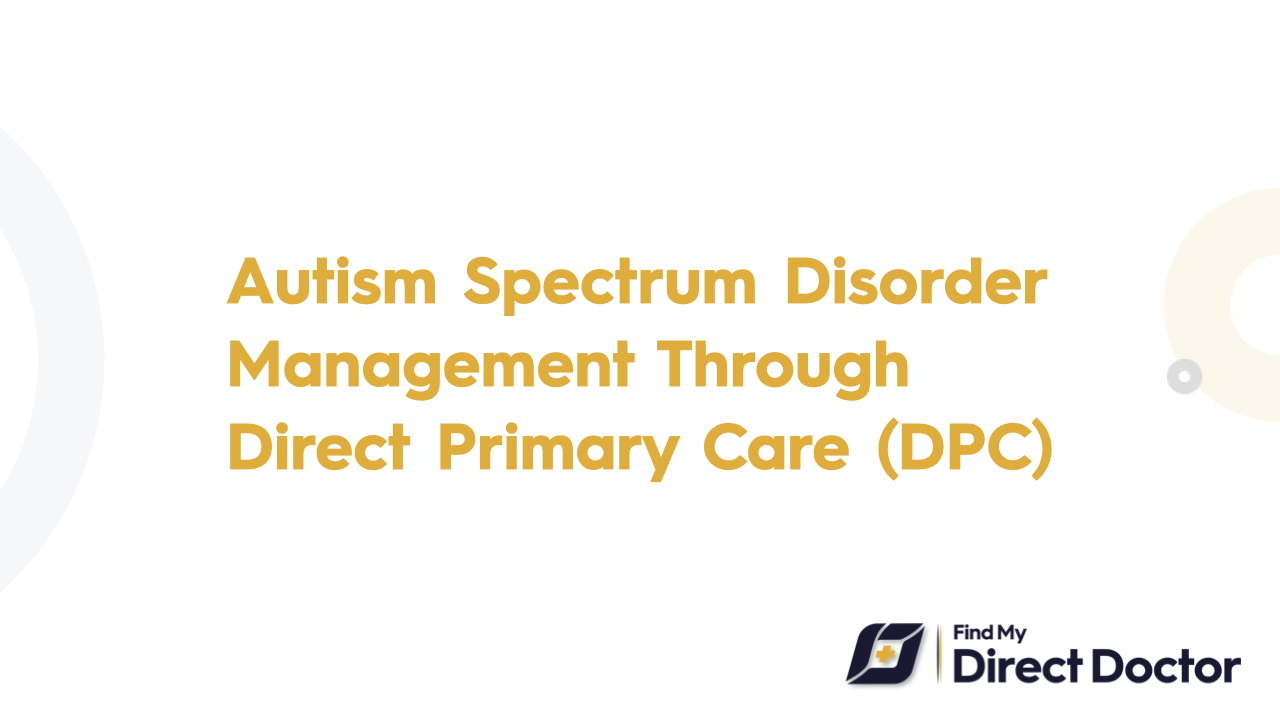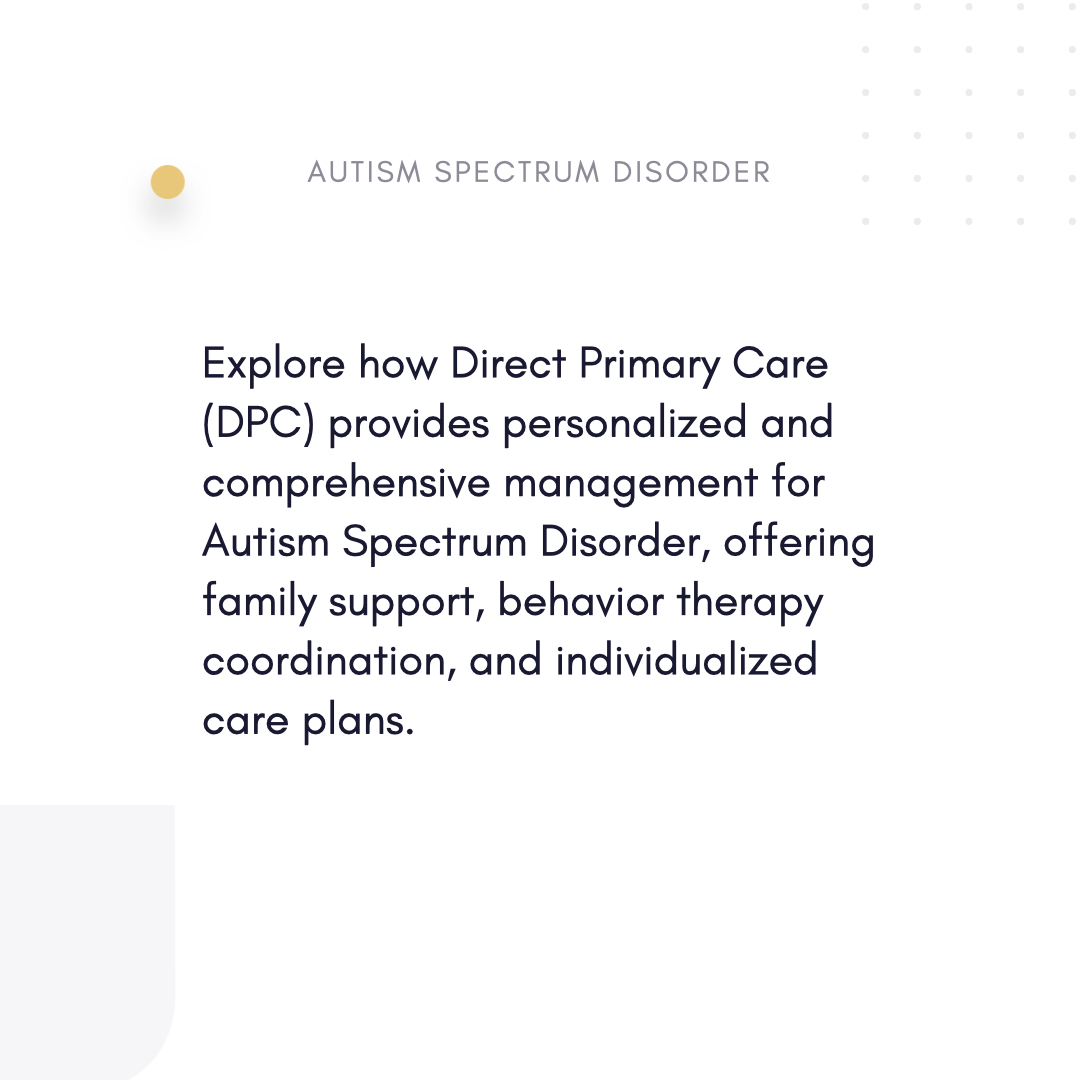Autism Spectrum Disorder (ASD) and Direct Primary Care (DPC): Compassionate, Comprehensive Care
A neurodevelopmental disorder, autism spectrum disorder (ASD) influences behavior, social interaction, and communication. Dealing with ASD calls for a multidisciplinary approach catered to personal needs. By means of accessibility, continuity, and tailored approaches to raise quality of life for patients and families, Direct Primary Care (DPC) presents a patient-centered model that enhances ASD treatment.

Recognizing ASD: Important Difficulties
Core Traits:
- Sensory sensitivity
- Repetitive behavior
- Social communication challenges
Comorbidities:
- Anxiety
- ADHD
- Gastrointestinal issues
- Sleep problems
Diagnosis:
- Clinical assessment
- Developmental tests
- DSM-5 criteria
Lifelong Needs:
- Early intervention
- Academic support
- Adult transition planning
How DPC Improves ASD Control
Offering unrestricted access to a primary care physician, Direct Primary Care (DPC) is a membership model (USD 50–200/month). This translates for ASD patients as:
- No waiting for urgent medical or behavioral issues
- Clear pricing: Discounted treatments, specialist referrals, labs
- Holistic treatment meeting family, developmental, and medical needs
Key Strategies:
-
Coordinated, Ongoing Treatment:
- Ground care in primary care with coordination among teachers, neurologists, and therapists
- Use standardized templates for best practices (e.g., frequent GI tests, sleep assessments)
-
Individualized Medical Treatment:
- GI management: Address food allergies, constipation, or reflux common in ASD
- Sleep hygiene: Prescribe melatonin or recommend behavioral techniques
- Mental health: Use CBT or SSRIs for ADHD/anxiety
-
Family-Based Support:
- Parent training: Teach behavior management strategies like positive reinforcement
- Respite care coordination: Link families to local support networks
- Transition guidance: Help teens navigate independent living or vocational training
DPC's Advantages for ASD Individuals
Enhanced Continuity and Prevention:
- Track development and comorbidities in regular follow-ups
- Promote dental care, vaccinations, and mental health screenings
Affordable Solutions:
- Therapy discounts: Negotiated rates with ABA/speech therapists (USD 50–80/hour vs. USD 120+)
- Medications: Melatonin at USD 5–15/month or generic SSRIs
Customized Care:
- Tailored plans for nonverbal individuals, sensory needs, or comorbid conditions
- Collaboration with dietitians, neurologists, and psychiatrists
Individualized ASD Management in DPC
Drawing from CAST and SYNAPSE models, DPC emphasizes:
For Children:
- Early intervention: Partner with developmental pediatricians for speech/occupational therapy
- IEP/504 advocacy: Help families secure classroom accommodations
For Adults:
- Independent living skills: Collaborate with social workers/vocational trainers
- Mental health support: Address anxiety/depression linked to social challenges
For All Ages:
- EHR tracking: Monitor adherence to best practices (e.g., annual GI assessments)
- Sensory-friendly exams: Use low-light rooms, flexible scheduling, and noise reduction
Real-Life Success Stories
Case 1: Ethan, 5, improved communication through DPC-coordinated speech therapy and a sensory diet.
Case 2: Lila, 22, gained job skills via DPC’s vocational referrals, reducing her family’s care burden.
FAQs: ASD and DPC
Q: Can DPC diagnose autism?
A: DPC refers to developmental experts for diagnosis but provides ongoing post-diagnosis support.
Q: Are ABA therapy sessions covered?
A: DPC negotiates cash-pay discounts with local providers (USD 50–80/hour vs. USD 120+).
Q: How does DPC handle sensory-sensitive exams?
A: Many DPC clinics offer low-light rooms, flexible scheduling, and exam adjustments.
Why DPC Changes ASD Outcomes?
- Reduces fragmented care: Centralized coordination avoids treatment gaps
- Empowers families: Teaches self-advocacy, rights, and tools
- Lowers costs: Affordable therapies and medications ease financial strain
DPC Aligns with Best Practices
DPC’s model supports SYNAPSE/CAST principles by:
- Prioritizing continuity: Regular provider interactions build trust and adherence
- Using EHRs: Ensure compliance with ASD care guidelines (e.g., routine screenings)
- Focusing on prevention: Early intervention reduces long-term healthcare reliance
Embrace Neurodiversity with DPC
While ASD presents unique challenges, DPC offers families a partner committed to affordable, compassionate, and individualized care—empowering individuals to thrive at every life stage.






